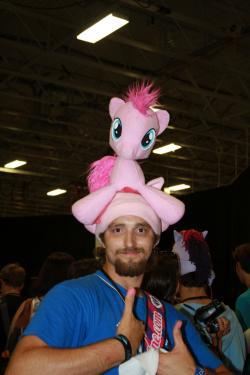“I’m a thirty-year-old man, happily married for five years, working as a defense contractor in conservative Georgia… and I dress like this,” says a man who prefers to go by the name “Faron.” He’s wearing a three-piece suit and a blue wig with matching whiskers, an homage to the animated character Mr. Fancy Pants. Faron is one of 4,000 bronies—grown men who are obsessed with My Little Pony—in attendance at BronyCon, a convention that took place outside of Manhattan over the weekend. Another 3,500 fans streamed the event online. Faron is very open about his love of the candy-colored ponies. He keeps figurines in his office, and he photographs ponies posed on aircraft and guns. The women at work seem to understand him, he said, and half of the younger guys don’t care. Some do tease him, but, he says with a broad smile, “I’m their superior.” At first, he says, his wife was a little uncomfortable with his costumes, but she’s gotten used to them.
Men—and some women—trot around the Meadowlands Exposition Center in homemade and custom-designed pony attire. Some of the bronies have been to other conventions like Otakon or Comic-Con, but BronyCon is a first for many. The crowd is mostly white nerdy dudes in their twenties—after all, this is a fandom that began online in a dark corner of 4chan—but the convention attracts all types. Joanna Blackhart, host of the podcast “My Little Dashie Show,” estimates that 15 percent of bronies are female, and another 15 percent are transgender. But the rest are just guys, who come with their families or without. “Bronies are redefining the word ‘bro’—for the better,” Blackhart says. They’re not afraid to break the gender barriers, and, she says, “they’re not just looking to prove they have the bigger set of balls.”
“You don’t have to fit in a certain mold,” says Jim, 27, from Pennsylvania. “You can just like what you want to like.” The brony community doesn’t care about race, ethnicity, religion, or gender. All they care about is ponies.
When she developed this iteration of My Little Pony, Lauren Faust aimed for something that would appeal to little kids without driving their parents up a wall. She succeeded—even more than she had expected. “It wasn’t something I was doing to break a stereotype,” Faust says. “I was looking for relatable characters.” Faust tried to incorporate what she calls “icons of girliness”—the tomboy, the debutante, the bookworm, the waif—in order to appeal to all types of girls. Often in animated TV shows, one girl represents “everything that is female in the world,” Faust says. “I wanted any girl—anybody—who watched the show to be able to find someone to relate to.” Along the way, she ended up appealing to grown men, too.
Purple Tinker, the founder of BronyCon, describes the event as men’s version of a feminist movement. These days, women are encouraged to work traditionally male jobs and to engage in traditionally male pastimes, Purple Tinker points out, but the reverse is not always true. “Women can wear pants, but men can’t wear skirts,” she says. “It’ll take a while,” she continues. “But the fact that the brony phenomenon exists is heartening. It gives me hope that one day, people won’t tell men, ‘You shouldn’t like that.’”
